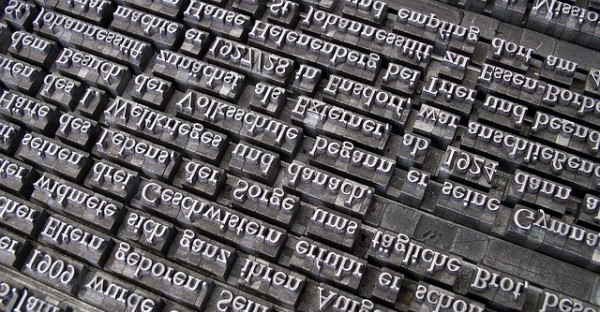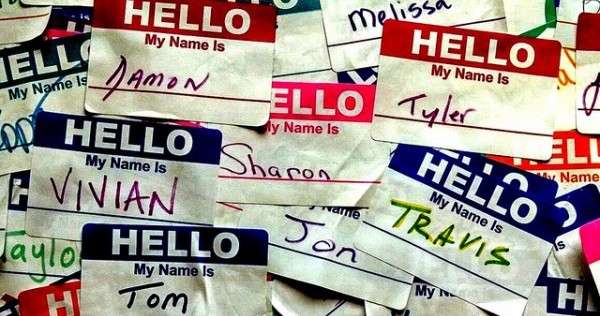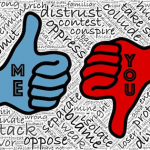
Galen Broaddus (atheist blogger at Across Rivers Wide): I’d love to talk this time about how we use language in the context of interfaith dialogue. I wrote a piece several months ago called Finding Common Ground Means Using a Common Language making the point that language can actually be somewhat exclusionary on its own, but I’m interested on hearing more perspectives than mine, which tends to focus on how atheist, secular humanist, and otherwise non-religious people feel in these contexts.
Hind Makki (Muslim blogger at Hindtrospectives): Thanks for starting off the conversation with your very thoughtful and thought-provoking piece, Galen. Nearly every time I say the phrase “interfaith,” I find myself having to explicitly underscore that the concept I am referring is absolutely inclusive of atheists, secular humanists, and people whose observance of their faith isn’t necessarily orthodox. That’s because when most people think of the term “interfaith,” they assume it only means very religious people or people ascribing to a religious belief system. But the way I think about the concept of interfaith cooperation is more sociological than religious.
Galen: “Interfaith” is one of those words, and unfortunately, I have seen all too many people in my “tribe” who eschew interfaith conversations not for principled reasons (i.e. they don’t really want to engage with religious people) but because they feel that the term excludes them. I’ve struggled with it, too, but it’s hard to get around the term even if we all agree that it has a degree of implicit exclusion.
Hind: It’s a clunky and, in many ways, outdated word. A lot of small-o-orthodox religious people don’t like it, either, because it connotes a watered-down, kumbaya type of belief that doesn’t take legitimate differences in religious convictions seriously. But is there a better word? I haven’t found one yet.
Galen: I’ve heard “interbelief” as an alternate suggestion, and I frankly think it’s kind of terrible, ha.
Hind: Interbelief is even worse! Ha! Of course, Diana Eck’s “Religious Pluralism” is my go-to deeper definition, but it can also be off-putting to some folks.
Galen: Your point about “taking legitimate differences seriously” is one that I do wonder about, Hind. In that piece, I was essentially arguing for a common ground that is religiously neutral, and while I think there are real benefits to that, I also have to recognize that shifting the responsibility of adapting one’s language to religious people does actually sometimes create a burden. Maybe that’s where intersectionality comes in again: A lot of religious minorities are involved in interfaith stuff.
To put it slightly differently: I should recognize that some religious people engaging in these contexts are subtly erased from them as well. I don’t want to be that person who makes the discussion all about my microaggressions. Others have them, too.
Andy Gill (progressive Christian blogger at Andy Gill): Yeah, I think my question is, regarding this topic: how then does the religious or nonreligious “minority” engage safely with the extreme side(s) of the religious majority?
Hind: There are a lot of people who are minorities in their religious tradition, or who observe their faith in a non-orthodox way, that are in the interfaith movement precisely because they feel more “safe” in interfaith spaces than within their own faith tradition. I’ve seen young Muslims from across the sectarian and orthopraxis spectrum who feel safer as Muslims in interfaith spaces than they do in orthodox Muslim spaces.
Andy, what do you mean by “extreme?” I think interfaith cooperation/dialogue can only work when everyone at the table believes all participants have an equally legitimate claim to their own belief system. Sometimes that places the burden on orthodox faith believers; other times that burden is placed on those engaging with those very same religiously orthodox folk.
Andy: Hm, yeah, I think I agree with that (as this week’s dialogue, I must admit, is one I’m mostly wanting to just learn from), but as I’ve grown up in conservative evangelicalism, I’d say the extremes are, in fact as you put very well, “those who do not believe all participants have an equally legitimate claim on their own belief system” (e.g. those who might say, “if you don’t believe in Jesus then you’re not saved…”).
Galen: That evangelical context is what I’m familiar with, too, Andy, and it’s a big part of why the language question here seems to matter a lot to atheists (who are still by and large formerly religious). We’ve lived with religion and see how language is constantly used to remind us that we’re on the margins. I mean, “In God We Trust,” anyone?
Hind: Yes, I am coming at this from a different angle than you two, because religious terminology in Islam is generally derived from Arabic. I feel like Muslims have the double burden of dealing with (mis)translations. I always roll my eyes a little at the phrase “the mecca of (insert something),” but that’s ultimately harmless. The mistranslations into English of the words jihad and kafir are much more egregious.
Galen: I bet you have fun with barely-informed people trying to explain to you what those terms “really mean,” right?
Hind: All the time! Especially on Twitter, people whose avatars are of US flags and eagles and guns and Pepe the Frog. Who are obviously all scholars of Islamic jurisprudence and Arabic linguistics 🙂
Andy: Ugh, I can’t even imagine… (well, sadly, I guess I don’t have to cause I see that sh*t all the time).
Galen: I should say, though, that I’ve been very pleased with how much language hasn’t been a barrier to our conversations (my crack about “sacred” in our first post notwithstanding, heh). It hasn’t felt like we’re separated by different languages because of our different backgrounds and (ir)religious positions.
Andy: Yeah, I agree. I’m glad you echoed that sentiment, as I was super nervous about the possible motivations for this particular topic, lol. Again, it’s that fear of dialogue; one never wants to offend, but it seems and feels like with social media bringing us all together, I’ve stepped on more toes in the last 5 years by accident than I think my grandparents have (without the Internet) in their entire (and still going) lifetime.
Plus, I’m “evangelical” (at least in my mind I am; maybe not so much a “Franklin Graham’s” mind) so, I know that my verbiage, outlook, shoot, my overall epistemology is the one that many times needs major correcting.
Galen: I think there’s a lot that we all can learn about how our language and perspective affects others from these conversations themselves. Gaining understanding is kind of the point, or at least one of them.
Hind: Definitely agree with both your points, gentlemen. I’ve been thinking about the concept of common language, in relationship to our conversation last week about silos. Our cultural silos and reliance on shortened communication via social media have flattened our vocabulary, I think. And that has led to evolving and politicized definitions that may not be helpful for honest cross-cultural, and interfaith, conversations.
Galen: And the miscommunications that can come as a result are harder to overcome when everyone’s not engaging in good faith discussion, which has also become strained. It’s a confluence of a bunch of terrible factors.
But I think those are problems bigger than just language. There are several issues that we have to overcome if we’re going to have better dialogue and improved understanding.
Hind: Those problems are definitely bigger than language, but they underscore our critical need — as a diverse society — to begin to agree on some shared definitions if we are to ever have fruitful dialogues that knock down our silos.
Andy: Closing thoughts: 1) I’m grateful for this dialogue as it beings me hope annnnnd I’m learning a ton. 2) I think that for all of us alive today, it’s truly up to us to engage and alter this conversation. The Internet, if you think about it, is up to all of us as to what its future will look like. That’s a hugely exciting and daunting but (if one is a cup half-full type of person) very amazing opportunity to create these types of “interfaith” dialogue while slowly but steadily doing away with all those cultural silos…
Galen: “Exciting, daunting, but amazing.” I hope you’re right, Andy!
Hind: I’m also grateful for these conversations; they help expand my own worldview, and I’m learning so much from both of you. #WarmFuzzies
Andy: ’til next week?
Galen: Looking forward to many more. See you both next week!
Image via Pixabay












